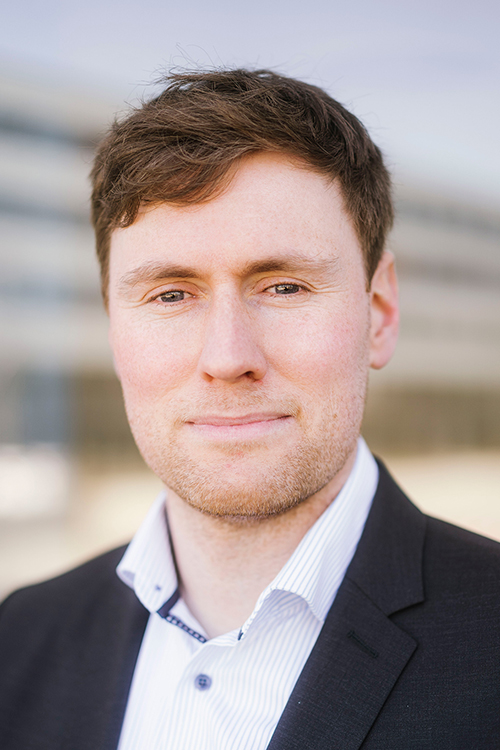Dr. Markus Schwenke (Business Administration and Engineering)
Dr. Markus Schwenke is originally from Berlin, studied Business Administration and Engineering at the BTU in Cottbus and then completed his doctorate in Business Administration at the University of St. Gallen. After gaining a wide range of professional experience at Daimler, the BTU spin-off 99coaches and Bundesdruckerei, among others, he returned to Cottbus, where he now works as a project coordinator at Innovation Hub 13.
Hello Markus, how did you come to study in Cottbus and how did it prepare you for your varied academic and professional career?
It's actually not very glamorous, as I had actually applied to TU Berlin and didn't get accepted there straight away due to the NC regulations. Someone in my family had studied in Cottbus in the GDR and that's where the recommendation came from. I was accepted to study in Cottbus straight away and then stayed at BTU even after the acceptance letter from Berlin arrived later.
I can answer the second part of the question with a concrete example: In an economics course at BTU, the methodology System Dynamics for modeling complex, dynamic Systems was presented. A member of the faculty then recommended that I spend a semester abroad in Bergen (Norway) to further deepen my knowledge of the methodology. After my return, I also used System Dynamics in my diploma thesis and then became part of the System Dynamics Group in St. Gallen.
You are now working as a project coordinator at Innovation Hub 13, what is InnoHub13 and what are your tasks in the project?
The Innovation Hub 13 is the interface between science, business and the public in the region along the A13 and is a cooperation project with the TH Wildau as well as two Fraunhofer Institutes and the Leibniz Institute for Spatial Social Research. As a translator, mediator and networker, we support the interdisciplinary exchange of knowledge, technologies and solutions in the fields of digital integration, lightweight construction and life sciences. Our aim is to bring together different stakeholders from science, business and society in order to jointly promote the further development of the region. As project coordinator, I take on classic project management activities, am currently very busy with staff development for the remaining project duration (until the end of 2022) and am coordinating the application for the second selection round.
Who are your customers and partners at InnoHub13, what specific services do you offer the regional economy, who should contact you?
We work closely with researchers who deal with current hot topics on a daily basis. They have access to state-of-the-art technical infrastructure and an extensive network of experts. In this way, they develop a pool of countless innovative ideas, technologies and solutions from which the local economy can draw. We offer a comprehensive range of services for scientists by bundling the transfer potential of their scientific work in so-called transfer profiles. This creates a pool of technologies and expertise that we can use to approach local companies. In order to capture the interests of the economy, we bring local representatives to the table with scientists, e.g. in our InnoMix format. Our third offer is aimed at the public: we make research and successful business collaborations accessible to a wider audience in various formats, events and exhibitions. We also integrate social concerns and ideas in citizen science formats. This creates a fruitful network and an active exchange between science, business and the public in the region, from which everyone benefits.
You are now working and living in Cottbus again, what makes the city and region attractive to you?
Various aspects. The housing market in Berlin is very tight, we didn't find anything suitable for a long time. After deciding to move to Cottbus, we found a place for our family of four relatively quickly. We also have a lot of friends and family in the immediate vicinity, so the social environment is very suitable for us. Finally, I now perceive Cottbus very differently with children and enjoy the many parks and green spaces along the Spree, the short distances to the green surroundings and the fact that everything is very close together and easy to reach by bike. I think that Lusatia is in a very interesting phase due to the structural change and that you can help shape something, as there are new players and new opportunities and old structures are being broken up.
What do you remember most fondly from your periods of study and what advice would you give students?
One of the best decisions was definitely to live locally and not commute, as some of my fellow students did. I actually have fond memories of my time on campus, specifically in the student residence. I was able to get involved on site, was on the student council and worked as a student (research) assistant at various chairs, making contacts that became relevant at later stages of my professional career. I would therefore definitely recommend students to do voluntary work alongside their studies or to pursue employment in order to build up a large network.
Contact us
Stabsstelle Friend- and Fundraising; Alumni
T +49 (0) 355 69-2420
daniel.ebert(at)b-tu.de

